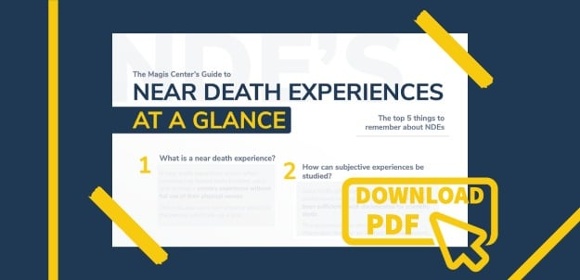Often, Catholics feel uncertain about what to make of near-death experiences (NDEs).
On the one hand, NDEs provide powerful testimony of the immortality of the soul and the existence of God. On the other hand, many near-death experiences contain elements difficult to square with Church teachings.
In this article, we'll take a close look at both sides of the Catholic discussion on NDEs. We've also included a free download of 5 things to remember about near-death experiences.
A Catholic View on Near-Death Experiences
Near-death experiences can be associated with the idea that God doesn't care about religious doctrine. Certainly, NDEs don't usually feature a direct revelation from God declaring that "the Catholic Church is the one true Church founded by Christ."
This may strike some Catholics as odd; why wouldn't God communicate important information like this? Furthermore, the vast majority of reported near-death experiences depict a positive view of the afterlife. Promoters of near-death experiences sometimes draw the conclusion that heaven is easily available. Many Catholics find this difficult to reconcile with our Lord's words in Matthew 7:13-14.
These are very valid concerns for faithful Catholics to have. When we look at all the information available to us, however, we see that near-death experiences need not imply that God doesn’t care about religion. What’s more, they can provide strong testimony to the existence of a transcendent soul, to the possibility of the resurrection of the body, and to God’s nature as unconditional love.
Do Near-Death Experiences Imply That Everyone Goes to Heaven?
When you're reading multiple accounts of NDEs, it's natural to begin to wonder what they imply about religion and morality. They may seem to suggest that everyone who dies will see the loving white light and that everything is going to be wonderful, regardless of how that person lived their life.
Could this be a deception to make people think that how they live doesn't matter? After all, in 2 Corinthians 11:14, Satan disguises himself as an angel of light.
But even in the most convincing false consolations, one can still sense the presence of darkness. The demonic spirit is not going to love somebody into a heavenly state. It's not within their capacity as dark beings. On their face, it seems unlikely that these experiences are deceptions.
While the vast majority, around 98%, of reported near-death experiences are positive, we should also consider a few other statistics. Consider that 85% of children who are resuscitated from clinical death have a near-death experience, but only about 9% of adults have an NDE. We need to ask the question, what about the other 91% of adults?
They're clinically dead: they have fixed and dilated pupils, a flat EEG, an absence of gag reflex, and their brain is essentially sputtering on almost nothing. Why shouldn't they, too, have a near-death experience?
For Catholics, it might occur that those who are destined for purgatory are not going to experience this fullness of the white light of God. Perhaps there is something left first for them to do, some final purification they must undergo. In that case, it would be reasonable to suppose that they would not experience an NDE full of loving white light.
It’s also worth bearing in mind that 1–2% of people who have NDEs do have negative experiences. And the negative ones are dark indeed.
At the very least, we can conclude that near-death experiences are quite compatible with the view that how we live our lives matters for the next life.
Near Death Experiences as Evidence of the Transcendent
Upon leaving the physical body, a near-death experience patient journeys to a transphysical state in which he or she frequently meets deceased relatives.
One peer-reviewed study reports an encounter with a child (whom we shall call John) who underwent a near-death experience.
John woke up from his coma to tell his parents, “I’ve just seen Aunt Nelly in San Francisco, and she said to tell you that she’s alright.”
The parents were astonished to hear this. They had not seen Aunt Nelly in years, and John had never met her. Subsequently, they found out that Aunt Nelly had died of a heart attack in the streets of San Francisco at the exact same time that John underwent clinical death in St. Louis, MO.
This encounter (one of many cited in the study) demonstrates the common ability of NDE patients to converse with the deceased.
Other patients describe events that occurred in the hospital room or exact conversations between loved ones in the waiting room as they lie clinically dead.
When properly vetted, Catholics could use these reports as evidence to show that there is more than just physical reality. Looking to read more verified NDE stories? Check out five credible near-death experience stories Magis Center has determined to be particularly thought-provoking.
What Does the Bible Say about Near Death Experiences?
Christians often appeal to the Bible either in support of near-death experiences or against them. The Bible, however, does not contain unambiguous references to NDEs. It does, on the other hand, leave the door open for at least some near-death experiences to be genuine.
For example, NDE skeptics might point to Hebrews 9:27:
"It is appointed for mortals to die once, and after that the judgment."
If we’re supposed to die once and then be judged, how can someone have a near-death experience? Wouldn't they end up dying twice? Why aren’t we judged at that time?
Without delving too deeply into this topic, we can say that it's important to read any line of Scripture in the context of the rest of Scripture. With this principle in mind, we can see that a too-strict reading of Hebrews 9:27 would contradict other parts of Scripture. If we can only die once, then Christ would not have been able to raise Lazarus from the dead. Consequently, however, we understand Hebrews 9:27, and we can be sure that it allows for the possibility of something like a near-death experience.
On the other hand, the Bible does have positive correspondences with near-death experiences. In 1 Corinthians 15:35-58, St. Paul tells us that we will have glorified, spiritual bodies in heaven.
A majority of people who undergo near-death experiences describe that they had a new transphysical form. This form was not subject to the laws of nature. Patients would hover above their physical bodies, pass through walls of waiting rooms and hospitals, ascend multiple floors of hospitals, and frequently go to “the other side.”
Although this transphysical form differs from Jesus’ resurrected body in terms of power and glory, recall that in Scripture, Jesus appeared as a spirit and walked through walls. Moreover, St. Paul tells us that in our glorified bodies, we will still be “embodied” (e.g., able to use our five senses).
This embodiment corresponds with reports of near-death experiences, as those undergoing one frequently are able to recognize the physical features of deceased relatives.
Thus, on account of the transphysical form of near-death experiences being able to transcend the laws of nature, there is a partial correlation between the transphysical form and what St. Paul describes as the glorified body.
Near-Death Experiences and God’s Unconditional Love
Another similarity between revelation and near-death experiences is the overwhelming presence of love that those feel while undergoing a transphysical journey.
Patients crossing over to “the other side” often encounter an overwhelmingly loving white light. A significant percentage of near-death experience patients describe this light as loving, affirming, affectionate, and, finally, compassionate. The transphysical form feels absorbed by this loving light while still keeping its own identity.
The love and benevolence of the white light seem to indicate the intention of a loving God to fulfill our greatest desire: unconditional love and joy with God throughout eternity. This resembles Jesus’ revelation of God the Father.
Catholic Saints and Near-Death Experiences
Catholics who are interested in near-death experiences often notice parallels between them and the stories of the saints. For example, a story is told of St. Philip Neri that at his request, a young prince was temporarily returned to life. The prince then recounted meeting deceased relatives in the afterlife.
Many other saints, such as St. Catherine of Siena or St. Faustina, are also believed to have had visions or experiences of the afterlife. It's natural to wonder whether these visions are relatable to near-death experiences.
It's useful to clarify here what the Church teaches regarding private revelations or visions such as these. Church approval for these cases means that Catholics may believe in them rather than that they have to. The Church does clearly hold, however, that God can give us the grace of an experience of the afterlife.
Suppose that a Catholic, after exercising his best judgment on the available scientific evidence, comes to believe that near-death experiences are genuine experiences of the afterlife. It would be premature to say that near-death experiences are exactly the same as the visions God has granted various saints. But, there is a very real possibility that NDEs are God's graces for us along the same lines as the visions of the saints.
What Can Catholics Learn from Near Death Experiences?
Clearly, not all near-death experiences are consistent with the teachings of the Catholic Church. Prudent Catholics should take near-death experience anecdotes with a grain of salt. We must beware of manipulative agendas and unbalanced individuals. Even well-intentioned and balanced individuals can misinterpret the meaning of their NDE. As in the case of visionaries, trained theologians and spiritual experts aid in understanding and interpreting any particular message or vision. As Saint Paul references in 1 Corinthian 12:10 in his list of spiritual gifts:
“To another varieties of tongues, to another interpretation of tongues.”
Respected scientists have conducted rigorous studies on near-death experiences. A significant body of evidence now exists, indicating that some near-death experiences are genuine. How should faithful Catholics respond to this evidence?
To be clear, the Church does not have an official position on NDEs. But in several main areas, the typical elements of near-death experiences parallel Church teachings.
First, near-death experiences show that we do, in a real and meaningful sense, survive after physical death. This evidence confirms the Church's teaching on the immortality of the soul.
Second, near-death experiences suggest that the essence of eternal life is love. Love is made manifest in near-death experiences by the loving white light, the love of Jesus, and the love and joy of deceased relatives. Thus, near-death experiences point to the truth of the central Christian tenet that God is Love.
Third, the experience of beauty and joy in many NDEs complements Catholic teaching on heaven. According to the Church, heaven is the state of supreme, ultimate happiness and joy.
Can Catholics Believe in Near Death Experiences?
Catholics should exercise good judgment when evaluating any particular NDE claim. But, given the rampant materialism of our culture, near-death experiences can be an occasion for us to praise God's mercy. He does not fail to provide us with all the help we need to hope in Him.
*Originally published on September 16, 2020


